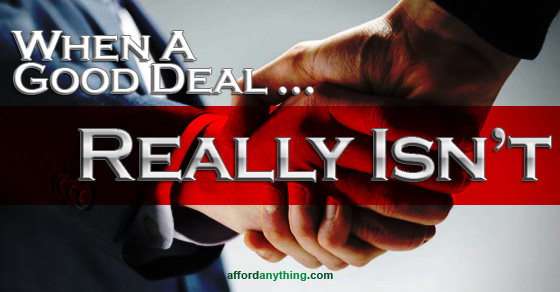 A few months ago, I found a great deal on Groupon: two tickets to a murder-mystery dinner theater for $50, including both dinner and the show. I asked Will if he thought we should get it.
A few months ago, I found a great deal on Groupon: two tickets to a murder-mystery dinner theater for $50, including both dinner and the show. I asked Will if he thought we should get it.
“We’re trying to save money,” he reminded me. It was true. In fact, the previous day we had just had a conversation about how we both wanted to save more.
“But it’s a good deal,” I replied. The package was discounted 70 percent off the normal price.
He shook his head. “Just because it’s a good deal doesn’t mean you should buy it.”
He was right. Coupons and deals are forms of marketing: they appeal to our thrill of the hunt. They fill us with the immediate gratification of “scoring” a deal. Victory!
That leads to impulse buying. I hadn’t been looking for tickets to a show, per se, but when I found cheap tickets, I almost made a spontaneous purchase.
That’s effective advertising. It’s also bad for our budget.
“Okay, fine,” I told him. “We won’t buy it.” I felt a burst of satisfaction: crisis averted. We had just “saved” $50. That was exciting.
“I Buy, Therefore I Am.”
I’ve hardwired my brain – through self-talk – to get satisfaction from saving money. It produces the same dopamine rush as the novelty of buying something new.
But our strengths are also our weaknesses: this same mental training makes me susceptible to marketing that appeals to my love for frugal finds.
Self-talk is powerful. People buy things that reflect the type of person they want to be.
If my self-talk said, “Paula, you’re sleek and chic,” I’d be drooling over luxury brands and designer labels. Why? The advertising reinforces that self-image.
But my self-talk says, “You’re responsible. You’ve got sensible Midwestern values.” This makes me vulnerable to advertising that fuels that self-image: Groupon deals, Craigslist finds, clearance-rack impulse buys.
But a Craigslist ad is still an ad.
It’s all marketing, every last “80 percent off!” of it. And it’s as pervasive, and as insidious, as glossy magazine ads featuring sexy people wearing $800 pants.
Marketers pay big bucks to get Groupons and coupons in front of you, because they know it works. It appeals to your sense of frugality.
Frugality is just another form of consumerism: it keeps your focus on consumption. Sure, you’re buying for less. You found a cheap couch or a half-off dinner. At the end of the day, though, you’re still buying stuff.
The alternative? Think about what you can contribute to this world … not what you can purchase. Bargain-hunting is for consumers. You’re a creator.
Like This Post? Want More?
- Read about the time I narrowly averted spending $250 on a broken phone …
- Or about my philosophy that you can afford anything, but not everything.
